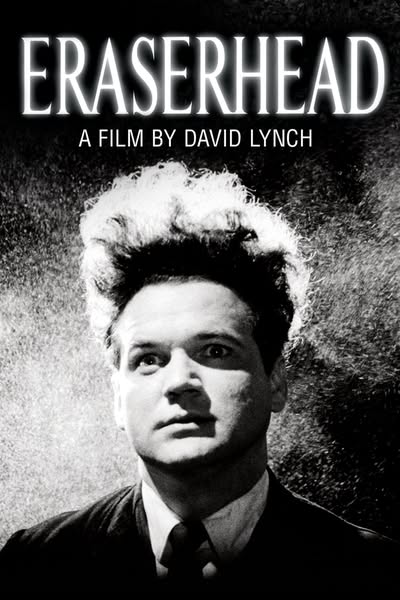Eraserhead (1977)

Eraserhead (1977) is a surrealist body horror film directed by David Lynch, marking his feature film debut. Known for its avant-garde style and unsettling atmosphere, the film has become a cult classic, praised for its unique approach to themes of anxiety, fatherhood, and the human condition.
The story follows Henry Spencer (Jack Nance), a quiet and introverted man living in an industrial wasteland. After a brief relationship with Mary X (Charlotte Stewart), Henry finds himself thrust into fatherhood when Mary gives birth to a deformed, constantly crying baby. As he grapples with the responsibilities of parenthood and the strange realities of his life, Henry’s psyche begins to unravel.

Lynch’s distinctive visual style is apparent throughout the film, characterized by stark black-and-white cinematography, eerie sound design, and surreal imagery. The industrial backdrop serves as a metaphor for alienation and existential dread, enhancing the film’s nightmarish quality. The haunting soundscape, filled with unsettling noises and ambient sounds, contributes to the overall sense of unease.
The film’s narrative is intentionally ambiguous and nonlinear, inviting various interpretations. Lynch often employs dream logic, blurring the lines between reality and nightmare. This approach creates a disorienting experience for viewers, prompting them to confront their own fears and anxieties.

Jack Nance’s performance as Henry is both captivating and disturbing, effectively conveying the character’s internal turmoil. The film’s supporting characters, including the bizarre Lady in the Radiator (Laurel Near), add to the surreal atmosphere, with her haunting song and strange presence embodying themes of hope and despair.
Eraserhead explores deep psychological fears, particularly related to parenthood, societal expectations, and the unknown. Its imagery and themes resonate on a subconscious level, making it a powerful exploration of human anxieties.

Upon its release, the film received mixed reviews, but it gradually gained a following and is now regarded as a landmark in independent cinema. Its influence can be seen in various films and art movements, cementing Lynch’s status as a pioneering filmmaker.
In summary, Eraserhead is a haunting and surreal exploration of existential dread and the complexities of human experience. With its striking visuals, unsettling sound design, and ambiguous narrative, the film stands as a testament to David Lynch’s creative vision and remains a significant work in the realm of experimental cinema.











